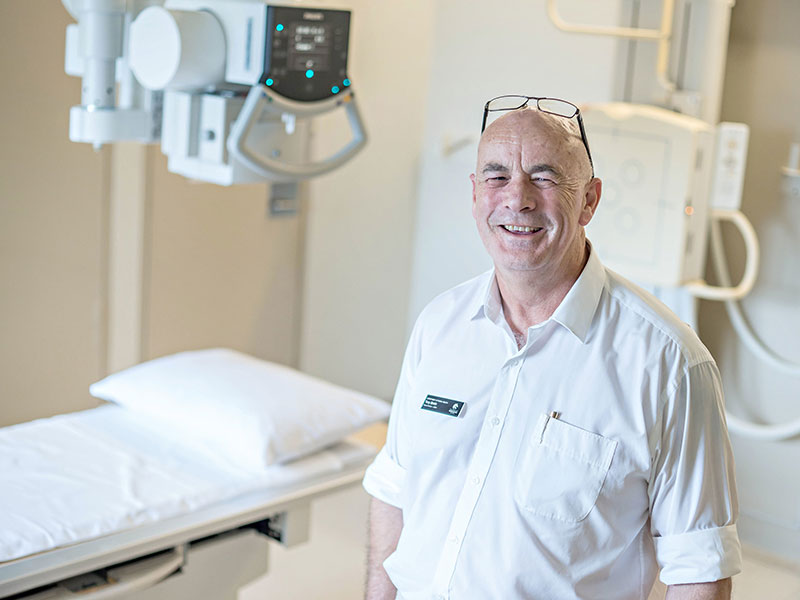Researcher Highlights
In a big country
Anthony Smith
Rural health professionals have very different challenges and incentives than do their city counterparts. Associate Professor Anthony (Tony) Smith works to develop ways of increasing the capacity of rural health professionals to provide better care for patients.
From dealing with a farmer who just spent three days harvesting before having his crushed foot examined, to being asked to diagnose broken bones at the supermarket, Tony speaks from experience when he says health professionals work differently in regional, rural and remote Australia.
After positions in both public hospitals and private practices as a diagnostic radiographer, Tony left full-time clinical practice to pursue a teaching and research career. He aims to help improve outcomes for rural health practitioners and their patients.
In 2003, he relocated to Tamworth with the advent of the University of Newcastle Department of Rural Health (UONDRH), where he is currently Associate Professor and Academic Lead (Research).
From the beginning of 2012, Tony’s position has been based at the UONRDH Manning Education Centre in Taree. There he continues to support students on placement, as well as providing support and continuing education to local health professionals and collaborating to build research opportunities.
“We want to increase the UONDRH’s research profile, encouraging medicine, nursing or the allied health professionals to take on some research as part of their role and support them to do it well,” Tony says.
Tony’s own research interests have evolved from medical imaging and radiation dosimetry to include rural health workforce issues and the development of new models of care that incorporate interprofessional education and practice. Collaborative, team-based care is essential to achieve optimal health care.
Recruitment and retention
Under the multi-million dollar Rural Health Multidisciplinary Training Program, the Federal Government funds universities to support and grow a strong rural health workforce in regional, rural, and remote Australia.
The University of Newcastle Department of Rural Health has major education centres in Tamworth and Taree, where students can spend up to a year of their undergraduate studies. The UONDRH also has hubs at Armidale, Moree, Port Macquarie, and Coffs Harbour, where students are engaged in shorter-term placements of two to eight weeks duration.
Through facilitating educational opportunities, plus conducting research into rural health issues, the UONDRH’s goal is attracting and retaining graduates who have undergone ‘conversion by immersion’ and ideally choose a career pathway.
Education for essential services
Tony is the first to admit that health outcomes for those who live in rural and remote areas are not as good as for those who live in metropolitan locations.
Whilst some factors in the equation, such as geography, attitudes to seeking health care and the availability of the latest technology may not change quickly, Tony is focused on long-term, sustainable improvements.
Since 1993, Tony has coordinated the NSW Limited Licence Radiography Course. Using mixed-mode delivery, the course permits general practitioners and registered nurses to be eligible to apply for a limited x-ray licence under the New South Wales Radiation Control Act 1990.
“Not every rural community has a qualified radiographer available all the time, but they do have a need for x-ray services,” Tony says.
“What we do is provide education, so remote and rural, non-radiographer health practitioners can provide a service that saves patients having to travel long distances for relatively minor diagnostic tests.”
“Working in remote and rural locations requires much dedication, so it is important to provide those health care professionals with opportunities to extend their role and develop new skills.”
Across professional boundaries
In 2006, Tony completed a PhD thesis titled 'Remote X-ray Operator Radiography: A Case Study in Interprofessional Rural Clinical Practice.’
“The most interesting thing I learned during my doctoral study was about the way that health professionals work together, and about the boundaries that exist between them,” Tony said.
“I am aware that professional boundaries do exist and that they are important. Professions have a role in actually preserving and developing knowledge and expertise,” Tony says.
“But being overly concerned about professional boundary issues may be counterproductive in a rural or remote context and create barriers to best quality care.”
“Interprofessional education is an important focus in the Department of Rural Health,” he continues. Led by Tony, the UONDRH successfully applied for a national award in 2014 for interprofessional education, developing opportunities for undergraduates to “Learn Together to Work Together”.
“We get students at undergraduate level together to learn about things at the same time, with a view to actually lowering the barriers that exist between health professions when they get out into the wards and clinics.”
Why rural health
Tony has led a number of projects using both quantitative and qualitative research methods to better understand the decision-making processes and factors that influence students and graduates to enter rural practice.
Results illustrate concerns and deficiencies, as well as the positive aspects. If you are after positives, speak to Tony.
From cheap house prices to easy trips to work through amazing landscapes, Tony will tell you all about the benefits of living and working in the country.
And, as far as professional practice is concerned?…
“One of the aspects of rural health that is really positive is that you get integrated into the community; people come to know and respect you,” Tony says.
“It is nice to be valued. You’re not just another number or cog in the machine.”
“You’re unique. You’re actually someone in the community, making a real difference to peoples’ lives.”
The University of Newcastle acknowledges the traditional custodians of the lands within our footprint areas: Awabakal, Darkinjung, Biripai, Worimi, Wonnarua, and Eora Nations. We also pay respect to the wisdom of our Elders past and present.